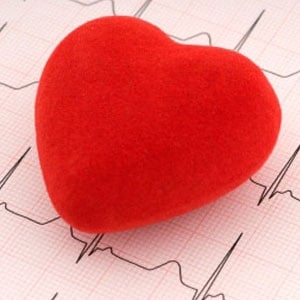
What is it and how does it work?
Beta-blockers have a long track record in treating hypertension and are also most effective in those with underlying heart disease like angina, previous heart attack or heart failure.
Beta-blockers are drugs that block two hormones from interacting with their specific beta receptors in the heart. These hormones, norepinephrine and epinephrine, are responsible for heart rate and pumping action. Blood pressure is lowered because of the decrease in heart rate and pumping action. Beta-blockers also suppress the production of renin, an enzyme in the kidney. This prevents the formation of Angiotensin II, a powerful constrictor of arteries. In this way, blood pressure decreases.
There are two types of beta-receptors. Beta 1 receptors are located mainly in the heart muscle and beta 2 receptors are in the airways and blood vessels. Cardioselective drugs act mainly on beta 1 receptors. Non-cardioselective drugs act on both types. Most side effects are related to beta 2 blockade and selective beta 1 agents are preferred. Some beta-blockers have alpha blocking activity.
A few beta-blockers
- Cardioselective: Atenolol in Tenormin, Hexa-blok, Adco-Atenolol
- Non-cardioselective: Propanolol in Pur-Bloka, Cardiblok, Inderal
- Non-cadioselective with alpha blocking action – Carvidolol
Who benefits from beta-blockers?
These drugs slow the heart rate and decrease the force of the heart beat. This reduces the workload of the heart and its oxygen consumption, and makes it beneficial to patients that suffer from angina. This effect, and the fact that it helps to control a rapid heartbeat, may protect a patient against a second heart attack. However, these actions may worsen heart failure. Beta-blockers can be helpful in patients with heart failure, but must be introduced at a very low dosage and used with caution. Only selected beta-blockers should be used for heart failure like carvidilol, bisoprolol and metoprolol. Beta-blockers also help to prevent attacks of uncontrollable heartbeats. Beta-blockers do not protect against stroke as well as other blood pressure drugs, especially in the elderly, and some guidelines (not all) recommend their use in the absence of heart disease only as fourth line treatment after diuretics, calcium channel blockers and ACE inhibitors or ARBs.
Compelling indications for use as antihypertensive drug:
- Patients with angina – chest pain due to decreased oxygen supply to the heart muscle
- Secondary prevention – after myocardial infarction, beta-blockers protect against a second heart attack, cardiac death and overall mortality.
- Rapid heart rhythm – called tachyarrhythmias like atrial fibrillation
- Patients with heart failure – very low starting dose (selected beta blockers only)
- Overactive thyroid gland
Possible indications in some hypertensives:
- Patients at high risk for cardiac disease undergoing surgery. The risk of heart attack is reduced.
How to take beta-blockers
Beta-blockers are usually taken once or twice daily, before or after meals. The types that need to be taken once a day help to improve the patient’s compliance, as it is more convenient.
These drugs should never be stopped suddenly after being used for a long time. This could cause a sudden and severe recurrence of angina. If beta-blockers need to be stopped, they should be withdrawn gradually under medical supervision.
Possible side effects:
The receptors blocked by beta-blockers in the heart tissue are also found in the lung. Blocking these lung receptors can cause the airways to constrict and precipitate or aggravate asthma attacks or cause wheezing. Although this is more likely when using non-cardioselective drugs, both types may affect the respiratory system. Avoid all beta blockers in asthmatics and use with caution in patients with a prior history of asthma.
Some patients experience fatigue and decreased exercise tolerance. Beta-blockers can constrict the blood vessels and cause cold hands and feet. Impotence and a lower sex drive are potential, but not common, side effects. Beta-blockers can cause a slight increase in blood fat abnormalities. The symptoms of low blood sugar can be masked in insulin dependent diabetics taking beta-blockers. In particular, symptoms like palpitations and tremor may be suppressed.
Different types of these drugs are available. Some mainly affect the heart, while others can reach the brain and may cause depression and nightmares.
Who should not take beta-blockers?
Compelling contraindications:
- Asthma
- Chronic obstructive airways disease – like emphysema
- Heart block or very slow heart rate (under 50 beats per minute)
Possible contraindications/caution or limited value:
- Peripheral vascular disease – blood vessel disease in the legs. Use the most cardioselective like bisoprolol.
- Abnormal blood fats especially triglycerides
- Insulin dependent diabetes – diabetes type I
- Pregnancy
- Athletes and physically active patients.
- As monotherapy in African patients – limited value
- Elderly hypertensives
Inform your doctor if:
- You have any lung disorders like asthma or chronic bronchitis.
- You have poor circulation.
- You have heart problems like heart failure or heart block.
- You have diabetes.
- You are taking other medication or self-medication.
Can it be taken with other medication? – Possible drug interactions
Beta-blockers are often used in combination with other antihypertensive drugs. In this way, lower dosages of each can be used, and fewer side effects are experienced. Beta blockers and diuretics are not generally recommended because of increased risk of diabetes.
Beta-blockers and certain drugs can lead to dangerous interactions. These include some anti-psychotics and drugs that alter heart rhythm like verapamil.
Antacids may reduce the absorption of some beta-blockers.
Written by Dr Kathleen Coetzee, MBChB
Reviewed by Prof Brian Rayner, head of the division of nephrology and hypertension, University of Cape Town and Groote Schuur Academic Hospital, December 2010
Read more:
Risk factors you can control
Alcohol and hypertension




 Publications
Publications
 Partners
Partners















